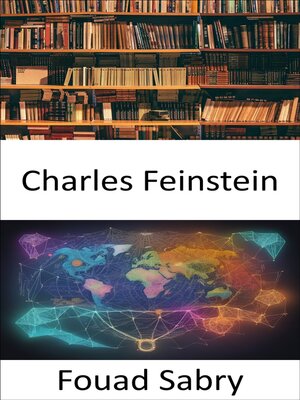Charles Feinstein
ebook ∣ Illuminating the Past, Shaping the Future · Economic Science
By Fouad Sabry

Sign up to save your library
With an OverDrive account, you can save your favorite libraries for at-a-glance information about availability. Find out more about OverDrive accounts.
Find this title in Libby, the library reading app by OverDrive.



Search for a digital library with this title
Title found at these libraries:
| Library Name | Distance |
|---|---|
| Loading... |
Who is Charles Feinstein
Charles Hilliard Feinstein, FBA was a noted South African and British economic historian. He was born in Johannesburg, received his early education at Parktown Boys' High School and studied at Witwatersrand University and Cambridge University where he completed his doctorate. In 1958, he joined the Department of Applied Economics at Cambridge. During this period, other notable economic historians such as Phyllis Deane and W. A. Cole were hard at work, extending data series on the UK economy back into previous centuries. In 1972, Feinstein published his magnum opus, National Income, Expenditure and Output of the United Kingdom, 1855-1965, which has since come to be seen as the standard reference work on UK economic data for the period. The Times said of this book:Although Feinstein undertook many more investigations, this was perhaps his crowning achievement. Of the several similar projects undertaken in different countries, for example the American, Canadian, Australian and German initiatives, it is fair to say that the one that Feinstein brought into being was the most elegantly reasoned, organised and presented. It was all the more remarkable for being the work largely of one man.
How you will benefit
(I) Insights about the following:
Chapter 1: Charles Feinstein
Chapter 2: Terence Ranger
Chapter 3: Peter Temin
Chapter 4: Charles Webster (historian)
Chapter 5: Charles Gabriel Seligman
Chapter 6: John Habakkuk
Chapter 7: Ronald Robinson
Chapter 8: David Abulafia
Chapter 9: Denis Twitchett
Chapter 10: Julian T. Jackson
Chapter 11: William Miller Macmillan
Chapter 12: Christopher Bayly
Chapter 13: Robin Matthews (economist)
Chapter 14: Maurice Beresford
Chapter 15: Roderick Floud
Chapter 16: Peter Mathias
Chapter 17: Martin Robertson
Chapter 18: Sidney Pollard
Chapter 19: Eric A. Walker (historian)
Chapter 20: Charles Wilson (historian)
Chapter 21: David Washbrook
Who this book is for
Professionals, undergraduate and graduate students, enthusiasts, hobbyists, and those who want to go beyond basic knowledge or information about Charles Feinstein.







